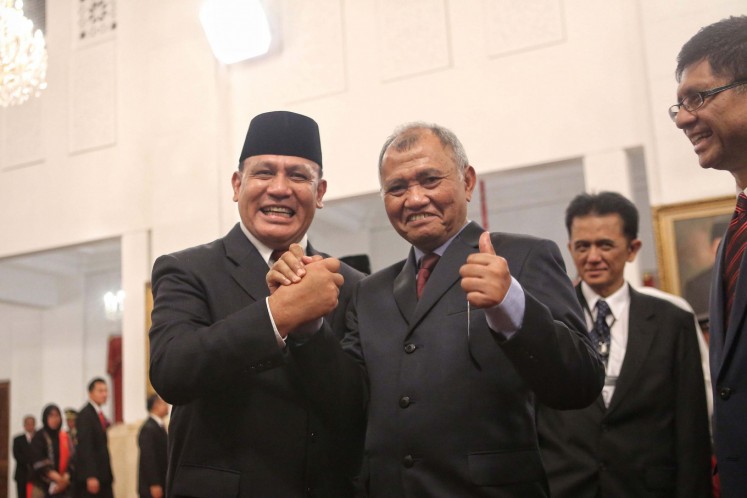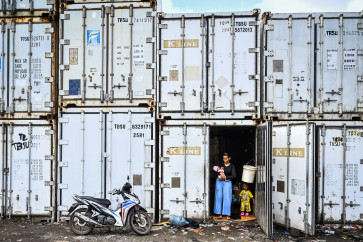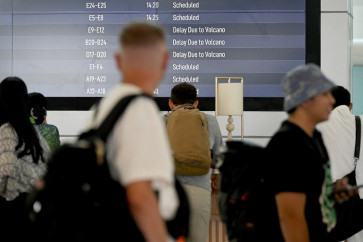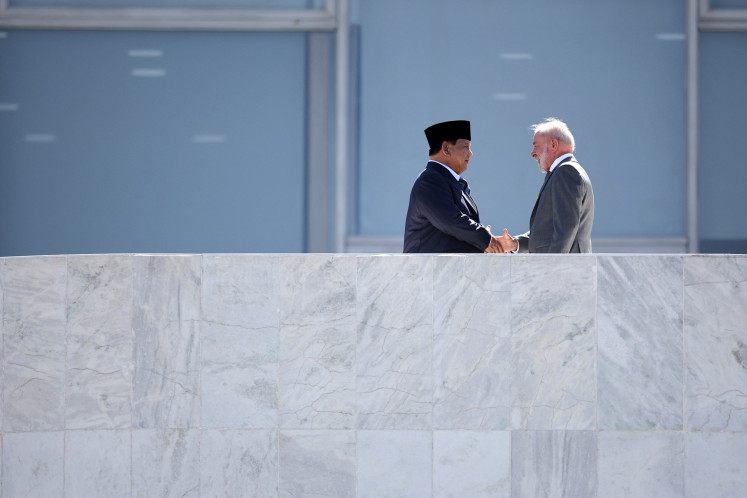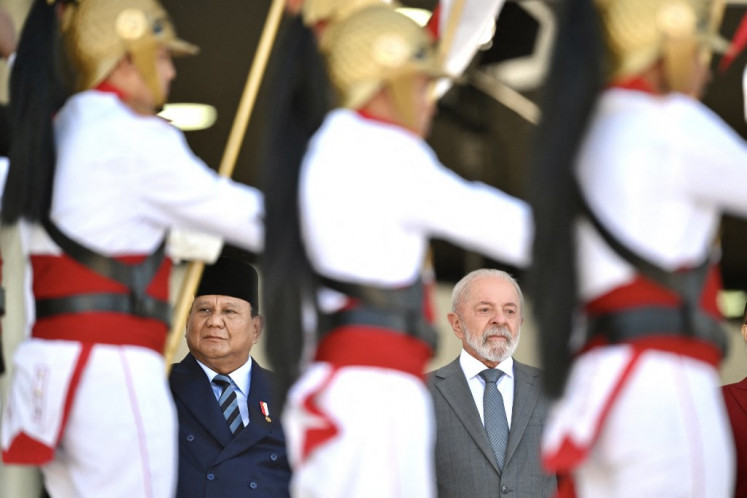Popular Reads
Top Results
Can't find what you're looking for?
View all search resultsPopular Reads
Top Results
Can't find what you're looking for?
View all search results100 days of blunders: Watchdog slams new KPK chairman's performance
Firli’s appointment, as well as the revision to the KPK Law, have been slammed by observers and anticorruption activists as an effort to defang the commission and limit its independence.
Change text size
Gift Premium Articles
to Anyone
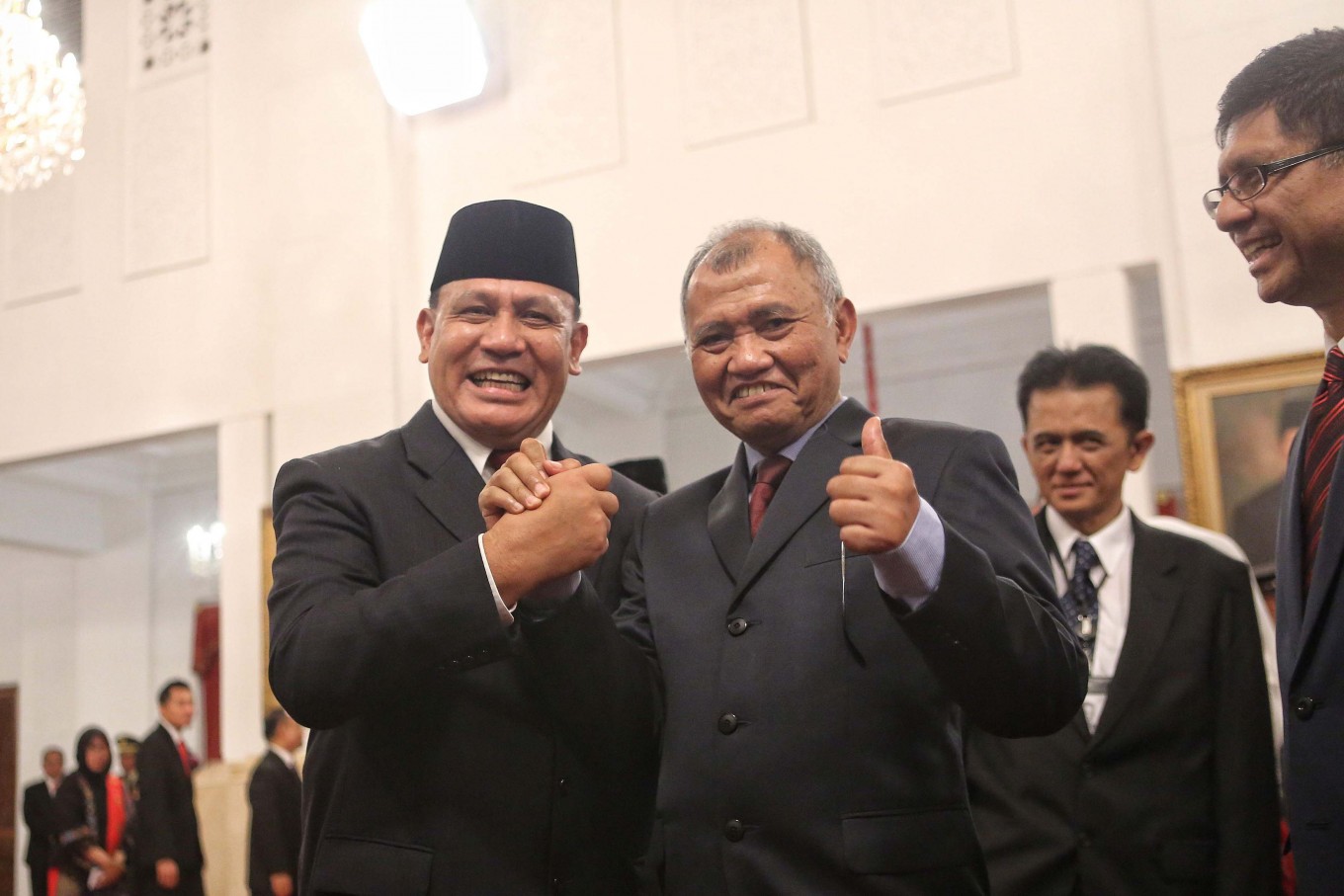 Taking the reins: Corruption Eradication Commission (KPK) chairman Comr. Gen. Firli Bahuri (left) and Agus Rahardjo, head of the antigraft body for the 2015-2019 period, smile as they shake hands after the inauguration of the new KPK leadership and supervisory council members at the State Palace in Jakarta on Dec. 20, 2020. (JP/Seto Wardhana)
Taking the reins: Corruption Eradication Commission (KPK) chairman Comr. Gen. Firli Bahuri (left) and Agus Rahardjo, head of the antigraft body for the 2015-2019 period, smile as they shake hands after the inauguration of the new KPK leadership and supervisory council members at the State Palace in Jakarta on Dec. 20, 2020. (JP/Seto Wardhana)
D
espite various controversies and an allegation of ethical violations, police general Firli Bahuri was selected by the House of Representatives as the new chairman of the Corruption Eradication Commission (KPK), the country’s leading antigraft agency, last year.
President Joko “Jokowi” Widodo eventually inaugurated Firli and four other commissioners to lead the KPK until 2024. Firli has asserted that the antigraft body will prioritize preventive, rather than law-enforcement, measures, making the arrest of officials suspected of committing corruption a thing of the past.
Firli’s appointment, as well as the revision to the KPK Law, have been slammed by observers and anticorruption activists as an effort to defang the commission and limit its independence.
Indonesia Corruption Watch (ICW) has slammed the new chairman for his “poor performance, but [abundance] of controversy” during his first 100 days of leadership, as written in a statement on Monday.
Here are several controversies in which Firli has been involved, as highlighted by the ICW.
Failure to capture fugitive suspects
As of today, the KPK has yet to arrest two individuals who are still at large months after the commission named them suspects, namely former Supreme Court justice Nurhadi and Indonesian Democratic Party of Struggle (PDI-P) politician Harun Masiku.
Nurhadi is suspected of allegedly accepting bribes amounting to Rp 46 billion (US$3.2 million) in connection with three cases handled by the country’s highest court between 2011 and 2016. Meanwhile, Harun has been accused of bribing General Elections Commission (KPU) commissioner Wahyu Setiawan in exchange for a seat in the House.
“The antigraft body had been known for its track record in finding fugitive graft suspects quickly,” ICW researcher Kurnia Ramadhana said. He cited the case of former Democratic Party politician Muhammad Nazaruddin as an example, as investigators captured him after he hid in Colombia in 2011.
Read also: Where is Harun? Family fears for fugitive's safety
Lack of transparency in investigations
In the past, the KPK was well known for its accountability in investigating corruption cases. However, things started to go south after Firli’s leadership began, as the ICW highlighted its lack of transparency in handling the graft case against Harun.
A KPK investigator was reportedly detained in the Police Staff College (PTIK) complex in South Jakarta as he hunted Harun. However, the antigraft body has revealed little-to-no details regarding the incident.
“None of the KPK commissioners has provided complete and honest information about the incident. [Firli] even refused to give an answer upon being asked by House Commission III [overseeing legal affairs],” Kurnia said.
Arbitrary treatment of employees
The ICW highlighted the current KPK leaders’ “arbitrary treatment of employees”, referring to the dismissal of investigator Rossa Bekti who was handling Harun’s case.
The KPK commissioners claimed Rossa was transferred back to the National Police per the latter organization’s request. The police, however, denied sending such a request.
“Rossa's term in the KPK was supposed to last until September. He had also never received any sanctions during his service,” Kurnia said, questioning the KPK’s decision to relieve its investigator of his duties.
Read also: KPK supervisors summon union head for criticizing investigator’s mysterious dismissal
Trial without defendant
KPK commissioners are mulling a plan to push for an in absentia trial of Harun, who is a key suspect in a bribery case.
“Instead of seriously looking for the missing suspect, the KPK has pushed for an in absentia trial of Harun Masiku. The regulations, however, only allow for such an approach in cases involving state losses,” Kurnia said, adding that the alleged bribery committed by Harun did not inflict any state losses.
Taking the reins: Corruption Eradication Commission (KPK) chairman Comr. Gen. Firli Bahuri (left) and Agus Rahardjo, head of the antigraft body for the 2015-2019 period, smile as they shake hands after the inauguration of the new KPK leadership and supervisory council members at the State Palace in Jakarta on Dec. 20, 2020. (JP/Seto Wardhana)Fewer prosecutions
As Firli pushed for more graft prevention, Kurnia highlighted that the KPK has prosecuted fewer people under the new chairman’s leadership compared with under previous leaders. According to data from the KPK, the antigraft body made 87 arrests with a total of 327 suspects between 2016 and 2019.
“However, under the leadership of Firli Bahuri, the KPK has only made two arrests, of the KPU commissioner and the regent of Sidoarjo [in East Java]” Kurnia said.
He added that the investigations leading to the two arrests were started during the chairmanship of the previous leader Agus Rahardjo.
Read also: KPK Law may hinder Indonesia’s performance in corruption perception index
Meetings with other state institutions
Since Firli has taken the position of KPK chairman, antigraft commissioners have visited other state bodies and institutions. They claim the meetings are to discuss graft prevention, including with the House, which has produced many graft suspects.
According to data from the KPK, graft busters have named 247 lawmakers and regional council members since the establishment of the commission.
The new KPK’s code of ethics even stipulates synergy with other state institutions.
“Between January and February, KPK commissioners visited 17 state agencies, including the House. This clearly illustrates that the KPK commissioners do not understand the importance of maintaining institutional independence,” Kurnia said.
Announcing termination of preliminary investigations
The antigraft body announced in February that it had dropped 36 cases during the preliminary investigation phase.
While such terminations are a common occurrence with law enforcers, the ICW pointed out that announcing them was unnecessary and had never been done before by the KPK.
“The cases could still be pursued if investigators later discover additional evidence, if only their termination was not announced. There are no regulations that stipulate the announcement of a preliminary investigation termination,” Kurnia said.
Read also: 'Maybe it's working': KPK says lack of raids thanks to successful prevention method
He went on to say that such blunders made by the new commissioners had severely eroded the public’s faith in the commission. Kurnia blamed the stagnation in KPK progress on President Jokowi and House lawmakers, who were responsible for the revision of the KPK Law as well as Firli’s appointment as the new KPK chairman.
KPK acting spokesperson Ali Fikri said the commission appreciated the ICW for giving its insights for “improvements”.
“We will keep working as hard as we can with other law enforcers to eradicate corruption from this country once and for all,” Ali said, as quoted by Antara news agency. (mfp)

